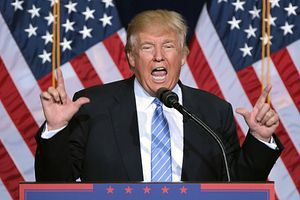An outsider runs for political office in a hotly contested election. He has a closet full of skeletons the conventional wisdom views as a liability, but he regards as an asset. He preys on distrust of the government, vowing to obliterate “politics as usual.” Against a backdrop of demographic change and economic disruption, the candidate exploits a once-dominant group’s fears of being left behind. His behavior may be unorthodox, but it is authentic and even reassuring to his base.
The United States, the world’s oldest democracy, has just watched this political story unfold, but it has played out many times before — including in the world’s largest democracy, India. For the past several years, I have been researching a book on politicians in India, where as many as one-third of national politicians won office in 2014’s general election despite being named in at least one ongoing criminal case. Rather than experience rejection at the ballot box, these non-traditional politicians have been richly rewarded. And their playbook is strikingly similar to the one Donald Trump executed with aplomb to win the 2016 U.S. presidential election.
At first I was tempted to ascribe the success of India’s tainted politicians to voter ignorance. In a country bedeviled by widespread poverty and illiteracy, it seemed plausible that voters unwittingly lend their support to such figures. Yet, the evidence suggests many voters knowingly support candidates with a reputation for wrongdoing. Many citizens distrust government and believe that the state is either unable or unwilling to perform its sovereign functions. At the same time, old social hierarchies built around caste are gradually eroding, challenging the primacy of traditionally dominant ethnic groups.
Enjoying this article? Click here to subscribe for full access. Just $5 a month.
Where government is ineffectual and social divisions are rife, politicians cynically segment the electorate — casting themselves as modern-day Robin Hoods. This allows a politician to spin his willingness to bend the rules as a necessary qualification for “defending” his community. The underlying conditions for this brand of politics are troubling, but they are not unique to India. Countries ranging from Pakistan to the Philippines exhibit similar tendencies. Indeed, American politics is littered with examples of politicians who have treaded similar waters — from former Massachusetts governor James Michael Curley to longtime Washington, D.C. mayor Marion Barry.
What makes 2016 different is that these dynamics are playing out at the presidential level. As in India, many Americans contend that the government is ineffectual. According to a recent Pew report, 19 percent of Americans trust the federal government to do what is right at least “most of the time.” In 1958, that figure stood at 73 percent. And just like India’s caste-based cleavages, social divisions were a hallmark of the recent U.S. election. With the ground primed by concerns over immigration and economic anxiety, Trump’s message was pitched to appeal to a specific subgroup of Americans — white voters — promising a return to the glory days of yore. The end result was a massive consolidation of the white vote, especially among those without a college degree.
While millions believed that the U.S. president-elect did not possess the traits typically associated with previous Oval Office occupants, enough voters felt he was the “change agent” they were looking for. Like Indian voters, members of Trump’s core constituency were doubtless aware of their candidate’s private and professional transgressions — his mistreatment of women, innumerable lawsuits, shadowy tax plays, and inflammatory nativism. In fact, one in five Trump voters had an unfavorable opinion of the GOP candidate.
And like his Indian counterparts, Trump was not shy about suggesting that he bent a rule or two over the years. As an Indian politician once explained to me, a candidate who is willing to break the rules can demonstrate that doing “bad” and doing “good” are two sides of the same coin. Playing on social anxieties and promising to do for the United States what he had done for his businesses, Trump told voters: “Nobody knows the system better than me, which is why I alone can fix it.” When Election Day arrived, 46 percent of Americans responded positively.
Ironically, Hillary Clinton, Trump’s opponent, also faced allegations of malfeasance. But unfortunately for her, a three-decade career in government inextricably linked her with the system many railed against. Her alleged wrongdoing was seen as an example of elite corruption, rather than an asset in defeating it.
Some Americans were undoubtedly inspired by Trump’s boorish behavior. But while most voters may not have voted for Trump because of his past transgressions, millions were willing to support him in spite of them. In other words, they held their noses and entered the polling booth with eyes wide open. But another lesson from India is that democracy can be unforgiving; there is always another election around the corner. If Trump fails to deliver on his lofty promises, in four years those who held their noses will hold the door open as they usher him out.
Milan Vaishnav is a senior fellow at the Carnegie Endowment for International Peace and author of the forthcoming book, When Crime Pays: Money and Muscle in Indian Politics (Yale University Press, 2017).

































